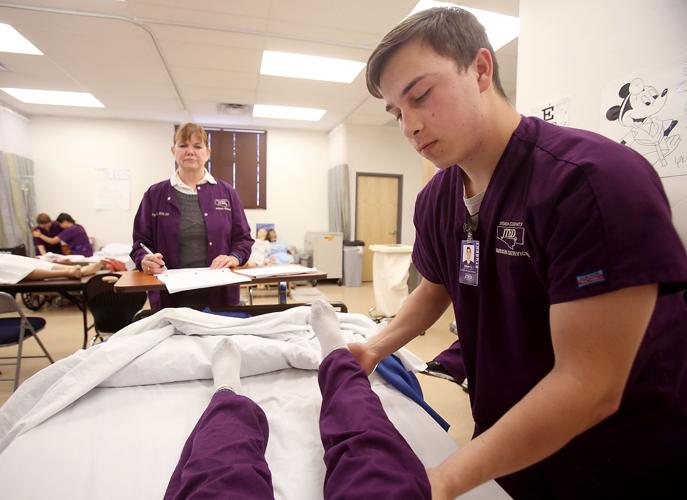Trineisha Shannel Carter, 19, tightened a strap around her classmate, Montana Donald, who was sitting on a hospital bed, lifted him up and swung him around to seat him on a wheelchair.
That maneuver — called a non-ambulatory patient pivot transfer — is one of the skills that Carter learned as part of the Pima County Joint Technical Education District’s certified nursing assistant program. She was performing the transfer during a skills portion of the class recently.
“I would love to be a nursing assistant and work in a hospital or a facility,” she said. “Then I want to go for my registered nursing bachelor’s in pediatrics.”
Carter graduated from Sabino High School last year but has continued with the nursing assistant program at JTED’s east-side campus. State law allows for graduates like her to enroll in JTED classes for a minimal fee until they are 22 years old.
However, that may be changing.
Students like Carter would not be funded if a bill to reverse a $30 million state funding cut to JTED is signed into law .
But without the restoration, the cut — about half the state funding JTEDs receive — would go into effect in July and put numerous programs at risk. JTEDs were set up by school districts to provide training in technical fields such as nursing and technology.
A Senate vote Wednesday to restore $28 million of the funding was rescheduled for Thursday, Feb. 11. The measure has already passed in the House.
But the measure comes with some strings attached, including not funding students who have graduated from high school or are older than 21, added accountability measures and requires additional financial or technical support from industries that benefit from JTED programs.
“We had to give some things up to get some things,” said Alan Storm, superintendent of Pima County JTED.
The funding cut to JTED last year and now the effort to restore the funding have been an “absolute rollercoaster,” he said.
“I’m still just sitting on pins and needles. I’m hoping and praying that it’s going to get fixed,” he said.
Joy Schaefer’s certified nursing assistant classes have six or seven students who have graduated from high school but stuck with JTED to pursue a career in health care.
It would be a shame not to fund those students, she said.
“We are putting people in the workforce,” she said. “We are building the taxpayer base. We’re helping the nursing shortage. Those kiddos are actually going on to get nursing and medical degrees.”
The two-year CNA program starts with a year of education in health-care basics, including anatomy and physiology, said Schaefer, a JTED teacher and registered nurse.
Students get to explore different medical fields and for the second year, they must choose a track, including CNA, medical assisting and physical therapy.
Through JTED’s CNA program, she said students can get licensed as a nursing assistant or a caregiver. Graduates go on to work in hospitals, long-term care facilities and assisted living centers.
“These kids do something with this program,” she said.
Schaefer said she talked to about 30 former students to see where they have gone. About 80 percent of those students went on to pursue a health-care degree in post-secondary institutions and 52 percent are working in a facility, she said.
The JTED program sets students up for a professional work environment, she said. Her students are currently in clinical training stages of the program, where they work in facilities under supervision.
Ethan Schisel, 18, got his high school diploma through an online school in 2015. He’s one of Schaefer’s CNA students.
Schisel, like his classmate Carter, wants to be a pediatric nurse and has a plan for how he’s going to achieve that goal.
He is finishing an internship at Tucson Medical Center, will have his nursing assistant license in four months and plans to work as a patient care technician while pursuing a nursing degree.
“I know exactly what I’m going to do and all of my friends and all of my coworkers know that I have goals,” he said.
JTED and the training it provided has a lot to do with how certain he is of his goal to be a nurse, he said.
“It makes it so that I know that I have a future,” he said. “I have a very close and attainable goal. It makes it so that I’m not just lost being out of high school.”
Storm said students who have graduated or are older than 21 would likely have to pay tuition to remain in JTED courses, though the district is exploring ways to help them out.





